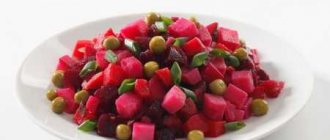Pregnancy is a special time for every woman. At this moment, a new life is born and developed in her body, already requiring care and attention. Of course, any mother wants the best for her baby, but any woman also wants to look good not only during this period, but also after the birth of the child. But, as you know, pregnant women are not recommended to go on diets, since the small body must receive all the substances necessary for its growth and formation through the mother. But there are some recommendations for women to eat at this moment in order to improve their well-being, have a positive effect on their body and the baby’s body, and also quickly get back into shape after childbirth.
The essence and general rules of the diet
The pregnancy period is divided into stages - trimesters. There are only three of them and each lasts three months. That is why the diet during pregnancy will also be divided into three stages, in each of which the diet will be adjusted, depending on those substances that will be especially useful for the growing body in a given period. Therefore, it may turn out that food that is very valuable in the first trimester can create problems for the child if consumed in the second trimester. The essence of the diet for pregnant women consists precisely in correcting the diet that is beneficial for mother and child at each stage of pregnancy, that is, by trimester.
Content:
- The essence and general rules of the diet
- Prohibited Products
- Diet in the first trimester
- Sample menu for 1st trimester
- Diet in the second trimester
- Diet in the third trimester
- Diet for excess weight
- Diet for edema
- Diet for constipation
- Morning sickness
- Heartburn during pregnancy
- Dietary recipes during pregnancy
- conclusions
Proper nutrition and hygiene are especially important during pregnancy. It is best to eat in small portions, but often. Since the growing belly puts pressure on the stomach and intestines and a large amount of food eaten can cause heartburn and heaviness in the stomach. It is better to eat your last meal about three hours before bedtime. One of the important rules is to compensate for the lack of vitamins, so throughout the entire period of pregnancy you need to take vitamin complexes prescribed by the gynecologist.
Prohibited Products
It is worth mentioning foods that are unacceptable for consumption during pregnancy. In principle, it is not recommended to eat all these foods in order not to gain weight, and in an interesting situation they are much more undesirable, since they can harm the health of not only expectant mothers, but also babies.
So, for all 9 months it is advisable to abstain from spicy and fatty, fried and salty foods. It is strictly not recommended to drink alcoholic beverages. It is also worth reconsidering your attitude towards exotic fruits, citrus fruits, strawberries and nuts. It is these products that often become allergy triggers. If you really want to eat an orange or strawberry, good for you. The main thing is not to overeat on them, so as not to develop a tendency towards allergies in your child.
Unnecessary weight in pregnant women: what to fear
If in the 2nd trimester during pregnancy the weight gain is over a kilogram per week, there is a threat of excess weight formation.
Serious consequences for the health of the expectant mother
Excess fat does not allow you to reliably monitor the baby’s development and provokes the occurrence of undesirable phenomena:
- varicose veins in the lower extremities;
- heart pathologies;
- damage to the central nervous system;
- dysfunction of the endocrine system;
- arterial hypertension;
- damage to the urinary system;
- load on the spine;
- miscarriage;
- operative delivery;
- post-term pregnancy;
- premature birth;
- the birth of a giant child.
Complications for the fetus
A woman’s obesity affects the condition of the baby even before he is born and contributes to the development of complications:
- hypoxia;
- disproportionate fetal development;
- lack of useful compounds;
- neurological disorders;
- tendency to become obese in the future.
Diet in the first trimester
The first trimester is very important for both mother and baby. It is during this period that the fetus begins to form and develop:
- the spine is formed;
- the heart and brain mature;
- the circulatory and nervous systems develop.
It is especially important during this period to arrange a woman’s nutrition so that the child receives all the substances necessary for full development. In the first trimester, it is better to use mainly protein foods, since protein is a building material for bones and cells. At this time, it is necessary to enrich the body with folic acid, which promotes the development of the baby’s nervous system and ensures timely cell division and growth. Also, to reduce the risk of fetal pathologies, it is necessary in the first trimester to increase the content in the body of such beneficial substances as zinc, iodine, selenium, cobalt and copper, as well as vitamins C and.
The following products will be useful during this period:
- various legumes;
- lean meats;
- eggs;
- vegetables;
- low-fat cottage cheese and cheese;
- liver;
- fresh juices;
- seaweed;
- whole grain bread.
It is recommended to give up fast food, carbonated sweet drinks, various canned foods, coffee, crackers, chips and hot sauces, and seasonings in the first trimester. It is best to give preference to vegetables and fruits that will be beneficial for both mother and child.
The mother’s feelings are especially strong in the second month of pregnancy. It is during this period that a woman gives most of the vitamins and nutrients contained in her body to the baby. Therefore, their deficiency should be replenished in a timely manner, and when the body asks for something, you should not refuse it. Hence the pronounced desire of a woman in the early stages to eat something extravagant or something non-standard.
Questions and answers
Question: WHERE DO I see a pregnancy nutrition specialist? A.Sh., Nalchik. Answer: A specialist in proper nutrition during pregnancy is available at the Women's Health Clinic in Pyatigorsk.
Question: How to properly organize NUTRITION during PREGNANCY in order to maintain health plus weight during pregnancy? Answer: An EXPERIENCED SPECIALIST in proper nutrition during pregnancy will help you maintain health and proper weight gain during pregnancy. A nutrition specialist during pregnancy is available at the Pyatigorsk Pregnancy Clinic by appointment by phone. 8 (calls within Russia are free), or (for foreign calls), or
Question: What VITAMINS can be taken safely during PREGNANCY? Z.Kh., Grozny. Answer: The question of which vitamins to take during pregnancy is decided by an obstetrician-gynecologist based on the health status of the pregnant woman and an analysis of the nutritional characteristics of a particular woman during pregnancy. At the Women's Health Clinic in Pyatigorsk, a specialist in proper nutrition during pregnancy is seeing you. Together with you, a specialist in proper nutrition during pregnancy will select what vitamins to take during pregnancy, what to eat during pregnancy, HOW MUCH SWEET you can eat during pregnancy, and will develop for you how to eat during pregnancy and organize nutrition according to the trimesters of pregnancy, explain in detail what you should not eat during pregnancy. pregnancy and how to PRESERVE a beautiful FIGURE and attractive appearance during pregnancy.
Question: Does the pregnancy nutrition specialist meet on SUNDAY? M.E., Baksan. Answer: A specialist in proper nutrition during pregnancy is available daily, 7 days a week, make an appointment by calling 8 (800) 500-52-74 (toll-free within Russia), or +7 (for international calls), or at the same time you can get a consultation with an obstetrician -gynecologist plus ultrasound during pregnancy, screening during pregnancy.
Question: Does a specialist in proper nutrition during pregnancy accept HOLIDAYS? E.K., Krasnodar. Answer: A specialist in rational nutrition during pregnancy in Pyatigorsk accepts DAILY and on holidays, appointment by phone. 8 (800) 500-52-74 (calls within Russia are free), or +7 (for foreign calls), or
Question: Can I take vitamin E during pregnancy? L.N., Rostov-on-Don. Answer: Vitamin E during pregnancy is necessary for the proper growth and development of the fetus. The required amount of vitamin E during pregnancy is at least 30 IU, according to the State Research Institute of Nutrition of the Russian Academy of Medical Sciences - 90-120 IU.
Question: Who can create a MENU FOR PREGNANT WOMEN who is overweight? P.K., Cherkessk. Answer: A specialist in proper nutrition during pregnancy at the Women's Health Resort Clinic in Pyatigorsk will help you eliminate excess weight during pregnancy and develop a diet for pregnant women with excess weight, organize tasty and non-starving MEALS during the TRIMESTERS of pregnancy.
Question: My pregnancy weight is LOW. How to achieve a normal weight for a pregnant woman and organize proper weight gain during pregnancy week by week? Zh.F., Makhachkala. Answer: Our specialist in proper nutrition during pregnancy, experienced obstetrician-gynecologist E.K., will help to achieve correct weight gain in a pregnant woman week by week and a normal weight for the pregnant woman. Ermolaeva.
Question: Where is the BEST pregnancy nutrition specialist? G.L., Moscow. Answer: According to numerous reviews from satisfied women, the best specialist in proper nutrition during pregnancy is seen at the Pregnancy Clinic in Pyatigorsk.
Question: Can excess weight in a pregnant woman be eliminated without pills through nutrition? V.E., Essentuki. Answer: Excess weight during pregnancy can be corrected without the use of medications with proper nutrition.
Question: WEIGHT CHART during pregnancy? Answer: The pregnancy weight chart is here.
Question: Who can create a competent and TASTY MENU for overweight pregnant women? E.Zh., Baku. Answer: An experienced specialist in proper nutrition during pregnancy, E.K., will help you create a balanced and non-starvation menu for pregnant women who are overweight. Ermolaeva. Appointment with a specialist in proper nutrition during pregnancy by appointment by phone. 8 (800) 500-52-74 (calls within Russia are free), or +7 (for foreign calls), or
Question: Tell us how to get pregnancy care at your famous Women's Health Clinic under your policy? What is needed for this: a consultation with an obstetrician-gynecologist at your Clinic, or a referral from my local gynecologist, or is just a desire and an insurance policy enough? Answer: You should contact your insurance company to obtain a cover letter. If you have a cover letter, you will be able to conduct the necessary examination, consultation with an obstetrician-gynecologist and further management of the pregnancy in our Clinic. When visiting an obstetrician-gynecologist, you must have your passport and insurance policy with you. Sincerely, Chief Accountant of the Women's Health Resort Clinic.
Question: Is it possible to issue a sick leave certificate at the Clinic for the period of pregnancy treatment? Answer: At the Women's Health Resort Clinic, sick leave (sick leave) is not issued.
Question: Do you provide documents to obtain a tax deduction for pregnancy? Answer: The resort women's health clinic provides documents to obtain a tax deduction for pregnancy care (13% tax refund).
Subsections
- Pregnancy management
- Cost of pregnancy counseling
- Screening during pregnancy
- Examination of pregnant women for congenital malformations of the fetus
- Comprehensive assessment of pregnancy markers
- Ultrasound of pregnancy
- Development of pregnancy by week
- Critical periods of embryonic development
- Possible problems during pregnancy
- Proper nutrition during pregnancy
- Hygiene for a pregnant woman
- Sleeping during pregnancy
- Risk factors (caution for pregnant women)
- Determining acceptable weight gain during pregnancy
- Determining your child's date of birth
- Assessment of fetal movement activity
- Sexual life during pregnancy
- Breathing and relaxation techniques during childbirth
- Literature for preparing for childbirth and raising children
- Premature birth, threatened miscarriage
- The first days after childbirth
- Program No. 7. Postpartum rehabilitation and VUM-building
- Program No. 16. How to remove belly fat
- Breastfeeding or bottle feeding?
- Breastfeeding: problems and rules
- Swaddling a baby
- Let's go to the maternity hospital! Things for mom and baby
- Measuring basal temperature and maintaining a graph
- Teeth and pregnancy
- Our mothers
- School of Natural Motherhood
- Questions and answers about pregnancy
- Reviews about pregnancy management in our Clinic
Sample menu for 1st trimester
The menu for a week in the first trimester may look like this:
- Monday - you can eat low-fat yogurt and muesli for breakfast, you can eat meat soup for lunch, a vegetable salad or just vegetables is recommended for an afternoon snack, you can cook rice with vegetables for dinner, and drink a glass of milk at night.
- Tuesday - you can start the morning with milk porridge and a sandwich with butter and cheese, fish soup is good for lunch, eat about 100 grams of cottage cheese for an afternoon snack, eat pasta with liver at dinner, and at night you can eat some vegetables or seaweed salad.
- Wednesday - about 150 grams of cottage cheese and green tea with cookies are recommended for breakfast, for lunch you can eat vegetable soup or puree soup, for an afternoon snack you can enjoy fruit, and for dinner you can eat a steamed chicken cutlet and mashed potatoes; before bed, low-fat yogurt will be enough.
- Thursday - in the morning you can eat buckwheat porridge with milk, yogurt and drink a glass of juice, for lunch prepare vegetable soup with a slice of bread, replace the afternoon snack with fruit or fruit salad, for dinner eat a vegetable salad and baked fish, before going to bed you can drink a glass of cranberry juice or juice .
- Friday - for breakfast, prepare bread with cheese and tomatoes, an orange and a glass of fermented baked milk or kefir, for lunch, eat pasta with meatballs and a vegetable salad, fortify yourself with a small amount of walnuts in the afternoon, and dinner can consist of potatoes baked in sour cream and herbal tea, You can end the day with a glass of fermented milk product.
- Saturday - you can start the morning with cheesecakes and herbal tea, you can also add a little dried apricots here, for lunch we recommend chicken soup and a slice of whole grain bread, for an afternoon snack you can grate a carrot with an apple, and for dinner you can eat a salad with cheese, tomatoes and herbs, before bed drink a glass of milk.
- Sunday - for breakfast, prepare oatmeal with milk and fruit and drink a glass of juice, for lunch, eat chicken soup, vegetable salad and green tea, for an afternoon snack, any fruit is allowed, and for dinner, a chicken cutlet and steamed vegetables, before bed you can eat low-fat yogurt.
This is an approximate daily menu that you can follow when creating your own diet. The main thing is to try to adhere to basic nutritional rules and follow the doctor’s recommendations.
Diet in the second trimester
During this period, the development of the vital organs of the fetus, formed in the first trimester, is in full swing:
- brain mass increases;
- the respiratory system develops;
- the skeleton and skeletal system are formed.
In the second trimester, you should pay attention to foods containing calcium and vitamin D, which are necessary to strengthen bones and properly form the skeleton. And also at this time, food rich in iron is necessary, since at this time the placenta and the baby’s circulatory system are formed. It is especially important to understand what food you can eat during this period. Here is a sample list of recommended products.
- raisin;
- spinach;
- egg yolk;
- fish, especially liver;
- dairy products;
- vegetable fats.
Foods that need to be excluded from the diet in the second trimester:
- spicy and smoked foods;
- fatty and fried foods;
- smoked meats and sausages;
- sweet and flour dishes.
During this period, you should control the amount of fluid entering the body, as well as the consumption of carbohydrates. Since their excessive absorption can cause unwanted weight gain. Walking in the fresh air will be very useful for the expectant mother in this trimester, especially since the baby needs oxygen right now.
An approximate menu at this stage may include the consumption of cereals, cottage cheese, vegetables, rye flour products, potatoes, meat dishes, eggs, low-fat cheeses, and dairy products.
It is very good to eat carrots at this time, as it will help saturate the body with vitamin A, and if you pour it with vegetable oil, you can also get useful vitamin E.
Sample menu for every day in the 2nd trimester:
- breakfast - omelet;
- second breakfast - low-fat yogurt;
- lunch - chicken, meat or fish soup;
- afternoon snack - any fruit;
- dinner - milk porridge or vegetable stew with meat;
- before bed - some fruit, vegetable salad or a glass of fermented milk drink.
Nutrition during pregnancy
During pregnancy, it is better for the expectant mother to be happy, content and healthy in order to give birth to a happy, content and healthy baby. And her diet should contain the necessary amount of vitamins and nutrients that will contribute to this.
By following general healthy eating principles, you will ensure that you have the best possible pregnancy diet. Consuming quality foods from all five major food groups is key to staying healthy and active. Let's list these groups.
- Vegetables and fruits (fresh, frozen, canned, dried; greens and lettuce). They deliver antioxidants, vitamins A, C, folic acid, dietary fiber, and potassium to the body. 7 – 8 servings per day (one serving is 250 ml (cup) of chopped vegetables or 125 ml (1/2 cup) of chopped fruit).
- Cereals (oatmeal, millet, corn, buckwheat, rice, bread - preferably grain or with bran, pasta, etc.), potatoes. They are sources of carbohydrates (starch), dietary fiber, thiamine and niacin. 6 – 7 servings per day (one serving is 1 piece of bread (35 g) or 125 ml (1/2 cup) rice or pasta).
- Dairy products (milk, yogurt, cottage cheese, kefir, cheese, etc.). Sources of calcium, protein, vitamins A, D, B2 and riboflavin. 3 servings per day (one serving is 250 ml milk, or 175 g yogurt, or 75 g cheese).
- Protein products: meat, poultry, fish, seafood, eggs, legumes, nuts. Provide the body with iron, protein, B vitamins, zinc, magnesium. 2 servings per day (one serving - 75 g or 125 ml).
- Fats (vegetable and butter, fish oil, nuts). Saturate the body with essential fatty acids, vitamins A, D and E. 30 – 45 ml (2 – 3 tablespoons) per day.
It is recommended to eat in small portions 5–6 times a day. Here is a list of the healthiest foods for the nine most important months.
- Green and yellow vegetables and fruits, and the queen among them is broccoli. The cute inflorescences of this cabbage contain an impressive number of substances that are absolutely necessary during pregnancy. Folic acid, vitamin C, magnesium, potassium, phosphorus, calcium, zinc, beta-carotene, selenium, vitamins PP, K, E. This low-calorie vegetable is rich in fiber, which helps normalize digestion. In addition to broccoli, pregnant women should include more greens and spinach and other green and yellow vegetables in their diet - it is better to stew, steam or bake them, but not fry them. As for fruits, you should pay attention to green apples, which usually do not cause allergies.
- Lentils and other legumes are also an important part of the expectant mother's diet. They contain a large amount of vegetable protein and useful microelements: iron, calcium, zinc. And there is even more fiber than in “usual” vegetables! Low-fat, spicy lentil soup with chicken broth makes a great main dish for the whole family. It’s good to add a spoonful of yogurt or sour cream to it. However, the consumption of legumes should be treated with some caution, as they can cause increased gas formation and flatulence, which is already a problem for expectant mothers. Therefore, it is worth including dishes from lentils, beans, and peas in the diet after a “test drive” of a small portion.
- Eggs contain folic acid, which is so important for the proper development of the fetus, as well as selenium, choline, biotin, easily digestible proteins and amino acids, potassium, magnesium, phosphorus and calcium. Eggs are rich in vitamins A, E, D, B12, B3. But attention! Before eating, eggs must be heat treated; under no circumstances should they be eaten raw! Quail eggs are good for dietary nutrition. The body temperature of quails is so high that it does not allow the development of such a dangerous disease as salmonellosis. The content of vitamins A, B1 and B2 in them is almost twice as high as in chicken eggs, and in five quail eggs, which roughly correspond in weight to one chicken egg, there is almost five times more iron, phosphorus and potassium. You can eat no more than 2 chicken eggs and no more than 6 – 10 quail eggs per day.
- Fermented milk products, such as yogurt and kefir, promote harmonious digestion and the creation of favorable microflora in the stomach and intestines. Expectant mothers should definitely include in their diet various low-fat types of cheeses and cottage cheese, which contain a lot of calcium and phosphorus. During pregnancy or breastfeeding, you need to pay special attention to the correct choice of fermented milk products, because right now their optimal composition and “reliability” are so important. An excellent solution are products in this category, specially created for baby food. “Children’s” dairy products, as a rule, contain prebiotics and probiotics that support normal intestinal microflora and promote comfortable digestion, which is so important for the expectant mother.
- Fish is a somewhat less “heavy” product than meat, which is also better digestible. Expectant mothers are recommended low-fat varieties of sea fish: cod, navaga, hake, ice fish, sea bream, sea bass. It contains minerals, proteins, omega-3 fatty acids, which are necessary for the healthy development of the baby and the proper course of pregnancy. Only sea fish are rich in such acids, but river fish should be treated with great caution, because they may contain parasites. Raw fish is prohibited during pregnancy, and varieties such as king mackerel, swordfish, shark and tuna should be consumed in limited quantities. Fish of these varieties may contain methyl mercury, which poses a danger to the nervous system of the fetus if it accumulates in the maternal body. Therefore, nutritionists recommend eating such fish no more than once a week, and the approximate weight of a steak in its finished form should be about 150 g.
- Dietary types of meat - rabbit, turkey, veal - are useful during pregnancy, as they are rich in protein and at the same time low-fat. Rabbit meat is called the latest trend in modern cooking, and it is considered optimal for dietary nutrition. It contains many vitamins B6, B12, PP, as well as iron, phosphorus, manganese, potassium, etc. An excellent traditional recipe is rabbit stewed in sour cream with seasonal vegetables. Expectant mothers who love to eat delicious food will also certainly like steamed veal cooked in a slow cooker with prunes, or Moroccan-style turkey stewed with a mixture of spices and orange juice.
- Whole grains and cereals, such as wild rice, wholemeal bread, oatmeal, wheat germ, bran, buckwheat, are extremely important for digestion as they contain a lot of plant fiber, complex carbohydrates, as well as calcium, iron, magnesium, phosphorus and vitamins group B. Cereals can become an interesting side dish and act as the main dish. So, almost each of them can be prepared in the manner of vegetarian pilaf: first by stewing the vegetables in olive oil, and then covering them with washed cereals and simmering until tender.
- Oil, both butter and vegetable, is also useful for expectant mothers. Butter contains fat-soluble vitamins A, D, E and K. Vitamin A has regenerating properties and is important for vision, as well as for fetal growth. Vitamin D regulates cell division processes, promotes the absorption of calcium and phosphorus by the body (which is especially necessary during pregnancy), and participates in the synthesis of a number of hormones. Vitamin K affects metabolism and blood clotting. However, due to the high cholesterol content in butter, the norm for its consumption is no more than 15 - 30 g per day. Vegetable oils contain a lot of fatty acids, vitamins E, A, P. Vitamin E is absolutely necessary during pregnancy and is prescribed if there is a threat of miscarriage. It is worth paying special attention to unrefined “cold-pressed” oils: olive, grape seed, pumpkin, corn, sunflower.
Diet in the third trimester
In the third trimester, many women stop controlling their weight, believing that there is just a little left and now it doesn’t matter how many kilograms you gain in the remaining time. But this is far from true.
During this period, it is recommended to consume a lot of carbohydrates, as they are a source of glycogen and accumulate it in the muscles, placenta and uterine musculature. But this does not mean that you need to absorb them uncontrollably. You also need to monitor the amount of carbohydrates you eat, since gaining excess weight in the third trimester can lead to unnecessary consequences. Not only can this result in a difficult and protracted labor, it can also threaten the lives of mother and baby.
In the last months of pregnancy, it is time to take care of excess weight and reduce, as far as possible, the calorie content of food consumed. It is best to eat in very small portions, but 6-7 times a day.
At this stage, you should pay attention to the following dishes:
- lean fish;
- nuts and fruits;
- vegetable soups;
- fresh vegetables;
- boiled or steamed meat.
You should not use in the third trimester:
- fatty meats and fish;
- various fats, you can only use butter and vegetable oil;
- saturated fatty broths;
- pickles;
- fried foods.
It is better to eat fish and meat dishes in the first half of the day, so the proteins are better absorbed by the body. It is better to enrich the second half of the day with dairy products and vegetables.
Sample menu for the day in the third trimester:
- breakfast - tea and sandwich with butter;
- second breakfast - egg and seaweed salad;
- lunch - light fish soup;
- afternoon snack - low-fat cottage cheese;
- dinner - mashed potatoes with lean meat or fish;
- before bed - fruit salad or juice.
Diet for excess weight
Excess weight during pregnancy always threatens with unpleasant consequences for both mother and fetus. It can cause high blood pressure in pregnant women, which can cause weak labor and hypoxia in the child. And large fetuses most often occur in women who are overweight. The presence of extra pounds can lead to late toxicosis, which is much more dangerous than toxicosis in the early stages: swelling increases, increased blood pressure is often observed, and poor urine analysis.
In such cases, the doctor may recommend fasting days. They can be done about twice a week. They involve the use of kefir, apples, and cottage cheese. But at the same time, you should be aware that if you are prone to edema, it is better not to use fruit or vegetable fasting days. Since vegetables and fruits contain a large amount of liquid, and instead of losing weight, you can get the completely opposite effect.
Sample kefir diet menu:
- breakfast - oatmeal with green tea and whole grain bread with cheese;
- second breakfast - low-fat yogurt;
- lunch - vegetable soup, boiled chicken, stew and a glass of tea;
- afternoon snack - kefir;
- dinner - low-fat cottage cheese, a third of a banana;
- at night - kefir.
It is important to remember that it is not recommended to carry out fasting days during pregnancy on your own. A mandatory consultation with a doctor is required.
In general, the best diet is drawing up the right diet, which should be followed throughout the entire pregnancy, especially if there is a problem with excess weight. It is better to eat little, but more often. During pregnancy you should not eat for two. It is at this time that moderation in food is needed more than ever.
Psychological support
It is very important to maintain psycho-emotional balance during pregnancy. For this purpose, meditation, yoga, and special breathing practices are used, which can be studied in special courses for pregnant women.
But a woman who also needs to solve the problem of excess weight during this period may need the help of a professional psychologist involved in psychocorrection of eating behavior. The fact is that losing weight is generally difficult - eating habits that have been fixed over the years, as well as psychological barriers and complexes, interfere. During the period of bearing a child, when “hormones play”, mood often changes, the perception of tastes and smells is distorted, this may seem completely impossible.
Diet for edema
Pregnant women, especially in the last months, are very susceptible to problems such as edema. Due to the fact that the enlarged uterus puts pressure on the blood vessels, excess fluid accumulates in the tissues of the body. Previously, doctors recommended limiting fluid intake, but recently the trend has changed dramatically. Now, with edema, on the contrary, it is advised to consume as much fluid as possible, since its lack can have a bad effect on the condition of the fetus.
The most important thing for edema is to limit your salt intake, and if possible, stop using it altogether. It is salt that has the property of retaining water in the body. In addition, salty foods invariably cause thirst.
The diet for edema recommends the use of steamed or boiled dishes, and abstinence from pickles and preserves.
Product groups
A pregnant woman should follow a balanced diet that includes:
- Fruits and vegetables. They can be in the form of juice, dried fruits. Canned, frozen or fresh foods usually contain more vitamins and other nutrients. Experts emphasize that it is better to consume fresh fruits than just drink juice, as the natural sugar level in juice is very high.
- Starchy foods rich in carbohydrates. These are potatoes, rice, pasta and bread. They contain carbohydrates and are an important component of proper nutrition during pregnancy.
- Protein. Healthy animal proteins come from fish, lean meat, chicken and eggs. All pregnant women, especially vegetarians, should consider the following foods as good sources of protein: quinoa grain, known as a complete protein (includes all essential amino acids), tofu and soy products, beans, lentils, legumes, nuts, seeds and nut butters.
- Fats. They should not make up more than 30% of a pregnant woman's diet. Scientists report that a high-fat diet may genetically program a child to have diabetes in the future. There are other risks to pregnancy with an excessively high fat diet, so a balance is needed, and Omega-3s or "healthy fats" rather than monounsaturated fats should be the main fat options. Examples of foods high in monounsaturated fats: olive oil, peanut oil, sunflower oil, sesame oil, avocado oil, nuts.
- Cellulose. Whole grains such as wholemeal bread, wild rice, whole grain pasta, legumes and lentils, fruits and vegetables are rich in fibre. Women have a higher risk of developing constipation during pregnancy. Eating plenty of fiber will effectively minimize this problem. Research has shown that eating plenty of fiber during pregnancy reduces the risk or severity of hemorrhoids, which progress as the fetus grows.
- Calcium . It is important to get your daily required amount of calcium. Dairy products such as cheese, milk and yogurt are rich in calcium. If the mother is a vegetarian, she should consume the following calcium-rich foods: calcium-fortified soy milk, tofu with calcium complex, soybeans, broccoli, collards, Chinese cabbage, beans and soy nuts.
- Zinc . This is a vital microelement. It promotes normal cell growth and development, regulates nucleic acid metabolism and protein synthesis. Important for fetal development. The best sources of zinc are chicken, turkey, ham, shrimp, crab, oysters, meat, fish, dairy products, beans, peanut butter, nuts, sunflower seeds, ginger, onions, bran, wheat germ, rice, pasta, cereals, eggs , lentils and tofu.
Diet for constipation
Constipation during pregnancy is scary primarily for the baby, since toxins have the ability to be absorbed into the blood and can enter the fetus and cause poisoning. The most likely time for their appearance is the third trimester, when the grown fetus puts pressure on the intestines, preventing the removal of processed food.
Constipation in pregnant women most often occurs due to a lack of fiber in the body. In order to replenish its reserves, doctors recommend consuming foods such as
- pumpkin;
- cucumber;
- beet;
- zucchini;
- carrot;
- tomato;
- dried fruits.
Fresh kefir or other fermented milk products are also good for constipation. Prune infusion will be safe.
If you have constipation, you need to give up white bread, semolina porridge, strong tea, and chocolate.
Morning sickness
This phenomenon of toxicosis can especially often haunt a woman in the early stages of pregnancy. It is possible and necessary to improve the condition and discomfort. To do this, you should not get up suddenly after waking up. It is recommended to wake up and lie on the bed for a while. Only a few minutes after you finally wake up can you get up.
You should eat no earlier than an hour after waking up, and in the evening you should never overeat. It is best to limit yourself to a glass of fermented baked milk or other fermented milk product.
Dietary recipes during pregnancy
The proposed dietary recipes will diversify your diet and help improve your well-being.
Omelette with vegetables
To prepare the dish you will need:
- eggs - 2 pcs;
- milk - 30 grams;
- white cabbage - 25 grams;
- butter - 5 grams;
- carrots - 25 grams;
- salt.
Wash and chop the vegetables, add a small amount of milk and butter, and simmer until tender. Then chop the vegetables. Beat eggs, add milk, salt and mix. Place the vegetables on a baking sheet, pour in a mixture of eggs and milk and bake.
Vegetable salad with cheese
To prepare you will need:
- tomatoes - 4 pcs;
- fresh cucumbers - 4 pcs;
- bell pepper - 4 pcs;
- feta cheese - 150 grams;
- green onions - half a bunch;
- dill - half a bunch;
- parsley - half a bunch;
- celery - half a bunch;
- basil - half a bunch;
- vegetable oil - 4 tablespoons;
- salt.
Best materials of the month
- Coronaviruses: SARS-CoV-2 (COVID-19)
- Antibiotics for the prevention and treatment of COVID-19: how effective are they?
- The most common "office" diseases
- Does vodka kill coronavirus?
- How to stay alive on our roads?
Wash and chop the vegetables, add chopped herbs, salt and mix. Place the salad on a plate, sprinkle with chopped cheese and pour over oil.
Recipes
Fruit salad for breakfast
Ingredients:
- tangerines – 2 pieces;
- kiwi – 1 piece;
- bananas - 1 piece;
- apple - 1 piece;
- drinking yoghurt – 100 ml.
Peel the banana and cut into thin slices. Apple, kiwi, tangerines are washed and peeled, cut into small cubes. Pour the prepared ingredients into a deep bowl and pour yogurt over it. You can decorate with raisins or raspberries.
Milk porridge with pumpkin
Ingredients:
- pumpkin - half a kilo;
- millet – 1 tbsp.;
- milk – 3 tbsp.
- butter - to taste;
- salt, sugar - to taste.
The pumpkin is thoroughly washed and cut into small cubes. Wait for the milk to boil in the pan, place the vegetable there, add salt and wait for it to boil again. The millet is washed several times. Combine with milk and pumpkin and cook under a closed lid for 10-15 minutes. At the end add a piece of butter. The porridge is transferred to ceramic pots. Be sure to cover with lids and place in a room heated to 130 degrees. oven for half an hour.
Broccoli soup
Ingredients:
- cabbage – 1 piece;
- potatoes - 3 pieces;
- salt - to taste.
Wash and peel the potatoes, cut into small cubes. Broccoli is divided into inflorescences. Place everything in a pan, pour boiling water over it and cook until the vegetables are ready. Drain the water, grind the contents of the container in a blender to a homogeneous consistency. You can dilute it a little with water from the pan. Place on plates and eat warm.
conclusions
During pregnancy, starvation diets are not recommended, even if there is a problem of excess weight. The best and most effective diet for pregnant women is to create your daily diet, taking into account the doctor’s recommendations and personal preferences. Each trimester of pregnancy has its own healthy diet, consisting of substances that are necessary for both mother and child at a particular stage.
Therefore, when creating a menu, you should pay attention to the beneficial substances recommended during this particular period. Numerous reviews indicate that a properly formulated diet will help not only get rid of edema, constipation, excess weight and other problems, but also improve the general condition of the body, prepare it for childbirth and the birth of a healthy and strong baby.
More fresh and relevant information about health on our Telegram channel. Subscribe: https://t.me/foodandhealthru
We will be grateful if you use the buttons:
Physical activity
It is necessary to understand that changes in nutrition during pregnancy are only part of the complex changes that occur with a woman during this period. The absolute rule should be to give up smoking and drinking alcohol, as well as increase physical activity (if it was previously low) to the level of 8-10 thousand steps daily and at least half an hour a day for moderate physical activity (such as special gymnastics for pregnant women or swimming).
The topic of physical activity is often discussed on forums for expectant mothers. According to reviews, by increasing the duration of walking and doing home exercises for pregnant women, you can not only reduce excess weight, but also cope with chronic fatigue, mood swings, and toxicosis.











